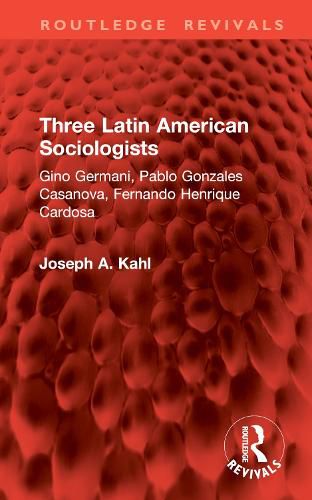Readings Newsletter
Become a Readings Member to make your shopping experience even easier.
Sign in or sign up for free!
You’re not far away from qualifying for FREE standard shipping within Australia
You’ve qualified for FREE standard shipping within Australia
The cart is loading…






Originally published in 1976 under the title Modernization, Exploitation and Dependency in Latin America, and again in 1988 under the current title, the author describes, examines and introduces the life and work of three of the most important figures in the development of comparative politics and political sociology: Gino Germani (Argentina), Pablo Gonzales Casanova (Mexico) and Fernando Henrique Cardoso (Brazil). At the time of its first publication, the book introduced those three Latin American sociologists to the North American social and political science community. However, as Peter Evans points out in his introduction, the book had not lost its importance in the intervening years. Rather, the subsequent developments in comparative scholarship have only highlighted the influence of the three Latin Americans. The developments in comparative and political social science can virtually only be understood in the light of the influence that the thought of Germani, Gonzales Casanova and Cardoso had on the discussions in North America.
$9.00 standard shipping within Australia
FREE standard shipping within Australia for orders over $100.00
Express & International shipping calculated at checkout
Originally published in 1976 under the title Modernization, Exploitation and Dependency in Latin America, and again in 1988 under the current title, the author describes, examines and introduces the life and work of three of the most important figures in the development of comparative politics and political sociology: Gino Germani (Argentina), Pablo Gonzales Casanova (Mexico) and Fernando Henrique Cardoso (Brazil). At the time of its first publication, the book introduced those three Latin American sociologists to the North American social and political science community. However, as Peter Evans points out in his introduction, the book had not lost its importance in the intervening years. Rather, the subsequent developments in comparative scholarship have only highlighted the influence of the three Latin Americans. The developments in comparative and political social science can virtually only be understood in the light of the influence that the thought of Germani, Gonzales Casanova and Cardoso had on the discussions in North America.